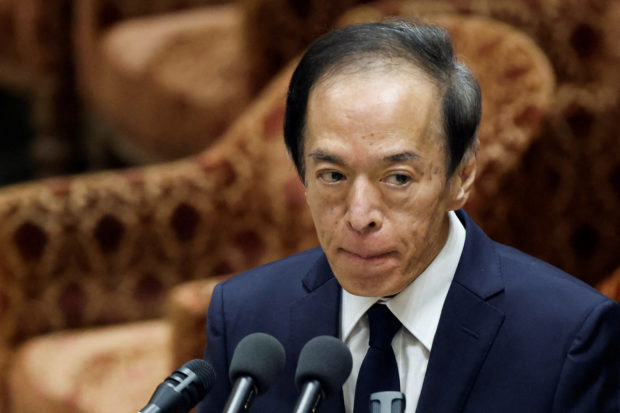Asian markets breath sigh of relief amid Ueda hearing

The Japanese government’s nominee for the Bank of Japan (BOJ) Governor Kazuo Ueda attends a hearing session at the lower house of the parliament in Tokyo, Japan. REUTERS/Issei Kato/File Photo
SYDNEY – Asian markets breathed a sigh of relief on Friday as the incoming head of Japan’s central bank soothed fears of an early end to super-easy monetary policy, nudging bond yields lower globally.
Kazuo Ueda, who will take over as governor of the Bank of Japan (BOJ) in April, began three hours of speaking to parliament at 9:30 a.m. (0030 GMT), offering markets a first glimpse of how the new-look central bank could steer an exit from ultra-low interest rates.
So far, Ueda has pledged to maintain ultra-loose monetary policy because inflation has yet to sustainably and steadily meet the central bank’s 2 percent target, and there was little indication that he would quickly unwind the BOJ policy called yield curve control (YCC).
“There have been high hopes that Ueda will bring a hawkish twist to the BOJ, but early remarks in his confirmation speech say anything but,” said Matt Simpson, senior market analyst at City Index.
Ueda’s confirmation hearing in the lower house comes as markets renew their attack on YCC, taking bets on a near-term interest rate rise.
Japan’s five-year government bond yield fell a little to 0.235 percent, from the previous close of 0.240 percent. Ten-year bonds did not trade early on Friday, due to thin liquidly, but bond futures extended gains.
The Nikkei share index was up 1 percent.
The yen remained choppy. It reversed an early rise to be largely flat at 134.71 per dollar.
“Overall Ueda is working hard to present himself as delivering continuity – at least to start with,” said Sean Callow, senior currency strategist at Westpac. “Now is not the time to put his own stamp on policy; that’s not why the government selected him.”
Data on Friday showed Japan’s annual core consumer inflation had hit a fresh 41-year high of 4.2 percent in January, keeping the central bank under pressure to phase out its massive stimulus programme.
Elsewhere, shares were mixed. MSCI’s broadest index of Asia-Pacific shares outside Japan slipped 0.2 percent, heading for a weekly drop of 1.5 percent.
Chinese blue chips fell 0.4 percent and Hong Kong’s Hang Seng Index dropped 0.9% while Australia’s resources-rich shares edged up 0.2 percent.
On Wall Street, stocks ended a topsy-turvy Thursday in positive territory, with the Dow Jones Industrial Average up 0.33 percent, the S&P 500 gaining 0.53 percent and the Nasdaq Composite adding 0.72 percent.
Investors were bracing for the release on Friday of the U.S. personal consumption expenditures (PCE) price index for January, the Federal Reserve’s preferred inflation measure. The index is expected to be up 4.3 percent on a year earlier, compared with 4.4 percent the previous month.
Overnight, strong data, including an unexpected fall in new claims for unemployment and a revised uptick in the fourth-quarter PCE price index, suggested some strength in the economy.
The dollar index, which measures the safe-haven dollar against six peers, was hovering at 104.63, not too far from a seven-week high of 104.78.
Treasury yields slid a little on Friday. The yield on the benchmark 10-year government bonds eased as far as 3.8590 percent, compared with the previous close of 3.8810 percent.
The two-year bond yield was hovering at 4.6810 percent, compared with the previous close of 4.6930 percent.
In the oil market, Brent crude futures rose 0.6 percent to $82.71 while U.S. West Texas Intermediate (WTI) crude was up 0.7 percent at $75.90.
Gold was slightly higher. Spot gold traded at $1825.13 per ounce.